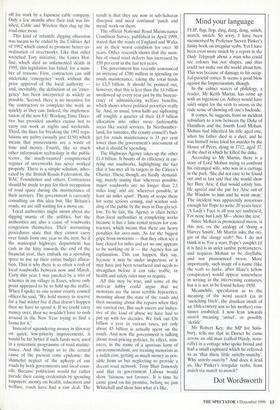Mind your language
FLIP, flap, flop, ding, dang, dong, snitch, snatch, snotch. So sorry, I have been mesmerised by Professor Steven Pinker's funny book on irregular verbs. Yet I have been even more struck by a report in the Daily Telegraph about a man who could see colours but not shapes, and thus could not make out the world about him.
This was bec.ause of damage to his occip- ital-parietal cortex. It seems a good blow against the Impressionists, though.
In the calmer waters of philology, a reader, Mr Keith Martin, has come up with an ingeniose (as Aubrey would have said) origin for the verb to moon, in the rude sense of showing off one's backside.
It comes, he suggests, from an incident subsidiary to a row between the Duke of Hamilton and the fourth Lord Mohun.
Mohun had inherited his title aged one, when his father died in a duel, and he was himself twice tried for murder by the House of Peers, dying in 1712, aged 37, in the duel in which he killed the duke.
According to Mr Martin, there is a story of Lord Mohun trying to confront his estranged wife, who was in a carriage in the park. 'She did not care to be found out and at last said that she would show her Bare Arse if that would satisfy him.
He agreed and she put her Arse out of the Window to him and he went away.'
The incident was apparently notorious enough for Pope to write 20 years later: 'A Lady's Face is all you see undress'd; For none but Lady M— shows the rest.' Since Mohun is pronounced moon, is this not, on the analogy of 'doing a Harvey Smith', Mr Martin asks, the ori- gin of the slangy verb? No, I do not think it is. For a start, Pope's couplet (if it is his) is in strict iambic pentameters, and requires Mohun to be disyllabic and not pronounced moon. More importantly, such usage of a name (like the verb to hurke, after Hare's fellow conspirator) would appear somewhere in writing in the intervening centuries, but it is not to be found before 1950.
Meanwhile, speculation as to the meaning of the word snotch (as in `snotching bitch', the drunken insult of an 18th-century son to his mother) con- tinues unabated. I now lean towards snotch meaning 'snivel', or possibly 'deride'.
Mr Robert Key, the MP for Salis- bury, tells me that in Dorset he came across an old man (called Hardy, natu- rally) in a cottage who spoke broad and had a small cupboard which he referred to as 'that there little snitchy-snatchy'. Why snitchy-snatchy? And does it lead us, like Pinker's irregular verbs, from snitch via snatch to snotch?
Dot Wordsworth


















































































 Previous page
Previous page